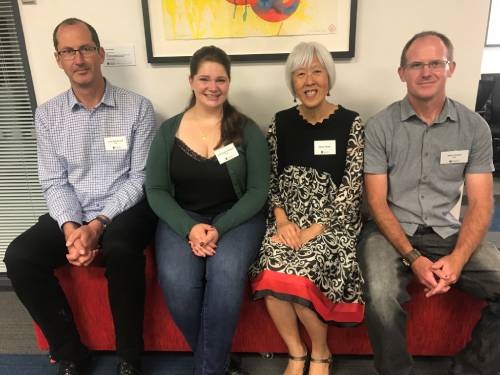Source: University of Waikato
When John Armstrong’s wife suggested he think about looking for a job he would love, John was perplexed.
After spending eight years in a factory gutting eels for export, he wasn’t sure such a thing existed.
Having done OK academically at high school in Te Kauwhata, John left school to a job on the local golf course, with the dream of working by day and practicing to become a pro-golfer by night. But when that didn’t pan out he fell into work at the local eel factory, and spent the next eight years in gumboots and overalls.
Almost content to get by with a work-to-live attitude, it wasn’t until John’s wife Kate suggested he try pursuing something he was interested in that he started to think seriously about a change.
“After all those years of doing the same thing every single day, I was getting to the end of my tether,” says John.
“Then for my birthday Kate gave me a wrapped-up prospectus for the University of Waikato. After flicking through it I saw so many subjects I was interested in, so I took the plunge and enrolled.”
In 2003 at the age of 29, and with Kate’s full support, John embarked on a Bachelor of Social Sciences, dabbling in several subjects before deciding to major in history and political science.
“For the first time, I wasn’t worried about having to go to work every day. I just wanted to learn, to open my mind and soak it all in,” he says.
Inspired by his lectures, John developed a true appreciation for learning, helped by a lecturer’s advice that if he studied what he loved, he’d get a job he loved.
“It was a privilege to learn from the likes of Catharine Colebourne, Ros McLean, Peter Gibbons, Jeanine Graham, Nepia Mahuika, and so many others in the history and political science departments.
“So many times, I would sit studying in the library and think how lucky I was to be here, and often I would walk home and think ‘wow, I have actually had my mind changed today’. It was an incredible feeling.”
The beginnings of an historian
John excelled in his studies, completing his degree with honours in history in 2006. He then nabbed a summer job with the Waikato Health Memorabilia Trust interviewing doctors and nurses on the history of Waikato Hospital. This research would form the basis of the book he would publish in 2009 – Under One Roof: A History of Waikato Hospital.
With the book as proof he could do a sustained research project, John was able to head straight into his PhD, which examined the overseas migration of New Zealand trainee medical specialists for postgraduate training after World War II.
John received several scholarships and prizes during his studies, including a full doctoral scholarship and the Michael Caiger Memorial Scholarship, which he says helped immeasurably.
“While the financial support was very helpful, the scholarships also felt like validation that I was on the right path, which spurred me on to keep studying and go on to a PhD.”
But can you get a job?
John says there’s lots of opportunities for people with a history qualification. “History graduates usually have excellent writing skills and an ability to think through complex information, which is crucial for any job – especially in the public sector.”
He should know – he’s currently a senior historian and negotiator at Te Arawhiti – the Office for Māori Crown Relations where he contributes historical research for settlement claims relating to the Treaty of Waitangi.
In his seven years at Te Arawhiti, John has worked extensively on settlement claims relating to the Taranaki region, including a role drafting the Crown’s apology for its invasion of Parihaka in 1881.
“It’s an incredible honour to be using my skills to contribute to the process of reconciliation in New Zealand. It becomes not just an intellectual exercise, but an emotional one too.”
From once believing a job you loved didn’t exist, John can’t quite believe where he’s ended up.
“Going to university as an adult student I could really appreciate what a gift education is and what incredible opportunities it can create. I’ve also come to realise that my previous life experiences gave me a perspective and set of skills that younger students don’t always have. That’s a powerful combination – it really helped me in my studies and it continues to help me in the workplace today.”



